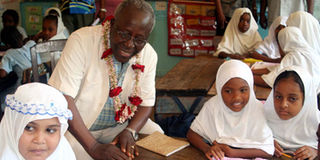Pupil welfare takes centre stage at meeting

Education minister Sam Ongeri with pupils from Central Girls Primary School in Mvita on Wednesday. The minister was on a tour of schools which have learning programmes sponsored by Unicef under the theme Child-friendly Schools. Photo/GIDEON MAUNDU
The place of the child took centre stage as headteachers of primary schools conclude their annual conference in Mombasa.
Matters to do with poor sanitation, pregnancies and early marriages of the girl child came to the fore. The conference, whose theme is “Child-friendly Schools – the Road to Vision 2030”, brought together close to 20,000 headteachers. And it could not have come at a better time and place, given the critical problems affecting thousands of children in Coast Province.
In Kaloleni District, for instance and according to the Ministry of Public Health and Sanitation, one in every four children is infected by worms, a situation blamed on poor sanitation and lack of awareness on the problem. District public health officer Esther Makazi said the biggest problem that has had a negative impact on the education of children was poor sanitation that required regular de-worming to help them carry on with education.
A campaign supported by well-wishers, among them the Nelson Dzuya Foundation and the Safaricom Foundation, has seen more than 100,000 children being de-wormed. Mrs Makazi said the campaign initiated by the ministries of Public Health and Education to de-worm the children was hit by lack of drugs, but the plight of thousands of children in the area had been taken up by donors who supported the de-worming exercise.
“At first people were complaining about the poor health of the children and low standards of education only to realise that the biggest problem was worms which had come as a result of poor sanitation. With the support from our friends, we have been able to roll out a programme to treat the children with good results,” she said.
Safaricom Foundation trustee Janice Mwendameru said they had funded the project to the tune of Sh2 million. “Our participation in this noble project has been informed by a study on de-worming for children carried by the relevant ministries, and the Nelson Dzuya Foundation in Kaloleni District, which proved de-worming as the most effective measure of improving school attendance compared to any other educational intervention.
“Findings from this survey also showed that de-worming reduced primary school absenteeism by at least a quarter within the two years of the project. The gains were higher among young children who suffered intense worm infections as a result of lack of sufficient clean water and poor sanitation,” she said.
Walking barefoot
Mr Dzuya said cases had also been attributed to cultural beliefs that discourage people from using toilets and instead opting to use the bush. With children walking barefoot, they end up stepping on the dirt and getting infested. According to Unicef, which is one of the key supporters of the headteachers conference, poor sanitation and lack of other amenities in primary schools had been blamed for lack of concentration and poor exam results.
According to Unicef, providing infrastructure and teachers alone was not enough in the development of a child. Unicef programme officer for education and young people in Kenya’s regional office Elias Jama Noor said for a child to develop fully, there had to be an all-round system to guarantee safety, hygiene and academic development.
Speaking at Central Girls Primary school in Mombasa during a tour to assess child-friendly learning, he said schools needed to ensure there was equity by encouraging the participation of all the children. “What we have realised is that children need more than good grades in class and final exams; they need clean toilets and security as well.
“In our campaign, we are calling on the government to ensure that primary schools have clean water because they are part of the success that the children are looking for in their learning environment,” Mr Noor said. As part of the project, he said Unicef had built modern toilets in seven primary schools in Mombasa, and 11 in Kilifi.
At the conference on Wednesday, it emerged that more than 500 teachers had been dismissed from service this year after being implicated in impregnating primary schoolgirls. The disclosure by TSC chairman Ibrahim Hussein also puts teachers on notice that besides losing their jobs, they will face criminal proceedings after the commission brought on board the police.
Last year, Mr Hussein said 600 teachers had their names struck off the TSC register for impregnating their pupils. But the chairman took issue with some parents who had been a stumbling block in the disciplining of errant teachers by opting to settle such cases outside courts.
“The number of teachers who have been sacked and taken to court may appear to be small but this is an issue of concern that we would need the support of the parents and the community to bring it to an end. “It is wrong for teachers who have been entrusted with the care of girls to turn against them and interfere with their education,” he said at the Sheikh Zayyed Welfare Centre in Mombasa where the Kenya Primary School Headteachers’ Association annual conference is taking place.
Education minister Sam Ongeri, in his opening address, said that despite a campaign on gender equity, some regions still discriminated against girls in the provision of education. He singled out North Eastern, Coast and Nyanza provinces where the number of girls in upper primary was low compared to that of boys and called on the headteachers to take up the lead in ensuring that there were equal opportunities for boys and girls.




